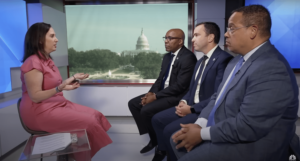Congress
State of Congress: House looks to California (and Trump)
The breakdown of the Senate is all but set. And a handful of races in California — and President-elect Donald Trump’s personnel decisions — seem likely to determine how much wiggle room Republicans will have in their probable House majority.
Arizona Senate: Almost a week after the election, the Associated Press called the open Senate race for Democratic Rep. Ruben Gallego over GOP nominee Kari Lake. His lead at the time of the call stands at about 72,000 votes. It’s a crucial win for Democrats, who will now have a minority conference of 47 seats in the Senate.
Pennsylvania Senate: Incumbent Sen. Bob Casey (D-Pa.) chipped away at GOP Sen.-elect David McCormick’s lead, but the Democrat still trails by 35,000 votes after more ballots came in on Monday. The Casey campaign isn’t conceding until the counting wraps, but he faces long odds to erase McCormick’s advantage. The AP called the race for the Republican several days ago. “Ruben Gallego and David McCormick have been invited to attend orientation,” a spokesperson for Majority Leader Chuck Schumer said Tuesday morning.
Battle for the House: Republicans have secured 214 called seats by the Associated Press — and currently lead in races that would give them 222 seats. Some of those may not hold, though. Here’s an overview of some of the most competitive seats:
- California 27th: Incumbent Rep. Mike Garcia (R-Calif.) said in a statement Monday night that he had conceded to Democrat George Whitesides, ensuring a flip of a GOP-held seat. Ballot drops have consistently broken in the Democrat’s favor as the process continues.
- California 47th: Democrat Dave Min expanded his lead over GOP nominee Scott Baugh to more than 3,200 votes — or more than one percentage point — for this open seat. An estimated 82 percent of votes have now been counted.
- California 13th: Democrat Adam Gray continues to chip into Rep. John Duarte’s (R) lead in this contest, which appears likely to come down to the wire. The incumbent currently leads by just under 3,000 votes with 62 percent of ballots counted.
- California 45th: A set of ballots dropped on Monday from Orange County broke heavily for Democrat Derek Tran, dropping Rep. Michelle Steel’s (R) lead to 3,908 votes. There are an estimated 16 percent of ballots still outstanding in the contest, so this one is likely to be a nail biter.
- California 41st: Longtime incumbent Rep. Ken Calvert (R) declared victory on Monday as his lead over Democrat Will Rollins stood at more than 7,500 votes. Rollins isn’t conceding yet, though it seems he’d need everything to break his way to overcome Calvert’s lead.
- California 22nd: Incumbent Rep. David Valadao’s (R) lead stands at just under 10,000 votes with an estimated 77 percent of ballots counted in this contest against Democrat Rudy Salas.
- Arizona 6th: Rep. Juan Ciscomani’s (R-Ariz.) lead swelled to nearly 5,000 votes over Democrat Kirsten Engel as more votes are tallied in this swing Arizona district. The AP has not formally called the contest, but this looks like a sure GOP hold.
- Alaska at-large: Observers are still waiting for ballots from rural Alaska to be tallied, but incumbent Rep. Mary Peltola (D) faces long odds to make up a 10,000 vote gap with GOP challenger Nick Begich. One thing to watch: If Begich doesn’t get to 50 percent, the state’s ranked-choice voting system kicks in.
One other thing to watch: Maine officials will run the state’s ranked-choice voting procedures Tuesday at 1 p.m. (watch on YouTube, if you’re into that). Incumbent Rep. Jared Golden (D) leads his GOP challenger Austin Theriault by more than 2,000 votes but came up short of an outright majority, triggering the ranked-choice voting system.
Things could get interesting fast for the GOP majority: Two House Republicans — Reps. Elise Stefanik (N.Y.) and Michael Waltz (Fla.) — have already been tapped by Trump for senior roles, opening up special elections for their seats. Waltz’s role doesn’t even require Senate confirmation, so he’ll vacate his seat immediately.
Called races by the AP Monday afternoon: Rep.-elect Cleo Fields (D-La.); Rep. Mark Takano (D-Calif.)
Congress
Thom Tillis denounces GOP megabill’s Medicaid cuts in fiery speech
Hours after announcing his retirement, Republican Sen. Thom Tillis went to the Senate floor and slammed the GOP’s plans for drastic Medicaid cuts — warning Republicans they are about to “make a mistake on health care and betray a promise” if their sprawling domestic policy bill passes.
“It is inescapable this bill will betray the promise Donald Trump made,” Tillis said. “I’m telling the president that you have been misinformed. You supporting the Senate mark will hurt people who are eligible and qualified for Medicaid.”
Tillis, who opposed the bill on a procedural vote Saturday night and then announced Sunday he would not seek reelection, said he could not vote for the Senate’s bill because of provisions that he said would kick some 663,000 residents of his state off their health care plans. He called on the Senate GOP to jettison its “artificial” July 4 deadline and rewrite the bill.
“I respect President Trump, I support the majority of his agenda, but I don’t bow to anybody when the people of North Carolina are at risk, and this puts them at risk,” Tillis told reporters after he left the floor.
The two-term senator who has been known for working across the aisle said he had done his own research on how changes to so-called state directed payments and a new cap on medical providers taxes would affect his state — contacting state legislative leaders, the state’s Democratic governor, Josh Stein and hospital groups.
Tillis said he also talked to CMS Director Mehmet Oz and presented his findings that showed the best-case scenario was a $26 billion cut in federal support.
“After three different attempts for them to discredit our estimates, the day before yesterday they admitted that we were right,” Tillis said on the floor. “They can’t find a hole in my estimate.”
In his remarks to reporters, he said Trump is “getting a lot of advice from people who have never governed and all they’ve done is written white papers,” adding that he has “people from an ivory tower driving him into a box canyon.”
Tillis, who was elected to the Senate in 2014, compared Trump’s “big, beautiful bill” to the Affordable Care Act: “The effect of this bill is to break a promise. And you know, the last time I saw a promise broken around health care, with respect to my friends on the other side of the aisle is when somebody said, ‘If you like your health care, you can keep it.’”
The Senate is now working through up to 20 hours of debate, before a marathon voting series of amendments scheduled to start Monday morning. Tillis said he might return to the floor to speak against the bill.
Trump lambasted Tillis Saturday night after he voted against opening debate on the megabill, and Tillis said he’d already told Trump at that point he was likely to retire.
“Pretty much what I said on the floor is what I said to the president last night and I stand by it,” Tillis told reporters after the speech, adding later that he told the President he “probably needed to start looking for a replacement.”
“I told him I want to help him,” Tillis added. “I hope that we get a good candidate that I can help and we can have a successful 2026.”
Congress
Rick Scott drafts key Medicaid amendment ahead of voting marathon
Florida Sen. Rick Scott is circulating text of his amendment to the GOP megabill that would effectively end a key Medicaid financing mechanism after 2030.
The provision won the backing of Senate Majority Leader John Thune during an eleventh-hour negotiating session held Friday night as a procedural vote was held open to win over Scott and other holdouts. It is expected to come up during the “vote-a-rama” set to take place overnight Sunday into Monday where dozens of amendments will be debated and voted on.
Scott said Sunday he’s “very confident that my amendment is going to pass.” Other Republicans are skeptical, with several in the GOP ranks nervous about cutting too deeply into Medicaid.
Under the amendment, the federal government’s 90 percent cost share for Medicaid enrollees made newly eligible under the 2010 Affordable Care Act will end on Dec. 31, 2030. Beneficiaries who were enrolled prior to that date would be grandfathered in at the old rate, but new enrollees would see their medical costs reimbursed at the lower “FMAP” rate, which can be as low as 50 percent, with states picking up the rest.
The amendment is co-sponsored by GOP Sens. Ron Johnson of Wisconsin, Mike Lee of Utah and Cynthia Lummis of Wyoming, as well as Finance Chair Mike Crapo of Idaho.
Congress
Republicans move forward with controversial megabill accounting move
Senate Republicans are on the cusp of formally adopting a controversial accounting tactic to zero out much of the cost of their massive domestic policy bill.
The matter came to a head on the Senate floor Sunday afternoon, when Democrats sought to prevent the use of the current policy baseline, as the tactic is known. Minority Leader Chuck Schumer objected to the maneuver and accused Republicans of setting a new precedent with the “budgetary gimmick.”
The Senate is set to vote on Schumer’s objection later Sunday or Monday, but Republicans believe their members will back up Senate Majority Leader John Thune and Senate Budget Chair Lindsey Graham.
That’s in part because they were able to sidestep a situation where senators would be asked to overrule Parliamentarian Elizabeth MacDonough on the baseline question. Instead, Republicans are asserting that Graham (R-S.C.) has the ability to establish which baseline is used under the 1974 law governing the budget process, rather than having MacDonough issue a formal ruling.
“There is nothing to debate and we consider this matter settled,” Graham spokesperson Taylor Reidy said.
The revised baseline allows Republicans to essentially write off the $3.8 trillion cost of extending tax cuts passed in 2017 that are set to expire at the end of the year. The effect on the megabill’s bottom line is profound as a pair of new Congressional Budget Office reports show.
One, released late Saturday night using the current policy baseline, showed the legislation would reduce the deficit by $508 billion. The other, released Sunday morning using the traditional method accounting for expiring provisions, showed the megabill would increase the deficit by $3.25 trillion.
“Things have never, never worked this way where one party so egregiously ignores precedent, process and the parliamentarian, and does that all in order to wipe away trillions of dollars in costs,” Sen. Patty Murray (D-Wash.) said during a speech on the Senate floor Sunday.
The maneuver came as little surprise. The GOP plan has been quietly in the works for months, and Thune had suggested they would reprise the no-formal-ruling strategy they’d used earlier in the process of passing the megabill.
“As we did on the budget resolution, we believe the law is clear that the budget committee chairman can determine the baseline we use,” Thune told reporters. Graham on Sunday embraced the CBO ruling showing the deficit savings — and his own authority to make the accounting change: “I’ve decided to use current policy when it comes to cutting taxes,” he said. “If you use current policy, they never expire.”
The baseline change is crucial for Senate Republicans because under the budget blueprint they adopted earlier this year, the Finance Committee provisions in the bill can only increase the deficit by a maximum of $1.5 trillion. The bill now under consideration wouldn’t comply under the old accounting method.
Sen. Ron Wyden (D-Ore.), the top Finance Democrat, called it “budget math as fake as Donald Trump’s tan” and said the GOP amounted to a “nuclear” choice that would weaken the chamber’s 60-vote filibuster.
“We’re now operating in a world where the filibuster applies to Democrats but not to Republicans, and that’s simply unsustainable given the triage that’ll be required whenever the Trump era finally ends,” he said.
-

 The Josh Fourrier Show8 months ago
The Josh Fourrier Show8 months agoDOOMSDAY: Trump won, now what?
-
Uncategorized8 months ago
Bob Good to step down as Freedom Caucus chair this week
-

 Politics8 months ago
Politics8 months agoWhat 7 political experts will be watching at Tuesday’s debate
-

 Politics8 months ago
Politics8 months agoHow Republicans could foil Harris’ Supreme Court plans if she’s elected
-
Economy8 months ago
Fed moves to protect weakening job market with bold rate cut
-
Economy8 months ago
It’s still the economy: What TV ads tell us about each campaign’s closing message
-

 Politics8 months ago
Politics8 months agoRFK Jr.’s bid to take himself off swing state ballots may scramble mail-in voting
-
Uncategorized8 months ago
Johnson plans to bring House GOP short-term spending measure to House floor Wednesday







